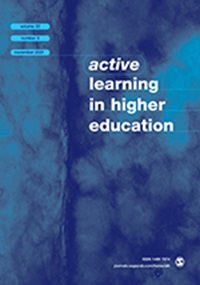Quectures: Personalised constructive learning in lectures
IF 3.8
1区 教育学
Q1 EDUCATION & EDUCATIONAL RESEARCH
引用次数: 8
Abstract
Active learning exercises engage students during lectures, but often fail to take account of the individual learning position of each student. The ‘quecture’ is a partially flipped lecture that incorporates students posing their own questions (quecture questions), discussing them during lectures and revisiting them later. These interactive learning events are designed to personalise students’ construction of learning during lectures. Quectures were trialled in direct comparison with both fully flipped and traditional lectures, providing information on student attitudes, experiences and engagement with the learning strategy. Quectures were favoured by participants over the two other lecture formats and were found to be helpful both in increasing learning and in improving study habits, although some students had difficulty adjusting to, or disliked, the new mode of learning. The student-posed questions were also perceived by students to improve enquiry skills and to personalise learning. Although many chose not to engage with the strategy, those who did felt more engaged with, and more responsible for their own learning during quectures than in traditional lectures. Future work will be required to generalise the effectiveness of this strategy as well as to fine tune for optimum benefit. It will also be important to investigate which subpopulations of students preferentially engage or disengage with the strategy, and to unpick any relationship between this engagement and academic performance.课程:个性化的建设性学习
主动学习练习在课堂上吸引学生,但往往没有考虑到每个学生的个人学习位置。“问答”是一种部分翻转的课堂,学生提出自己的问题(问答问题),在课堂上讨论这些问题,然后再重新审视这些问题。这些互动学习活动旨在个性化学生在讲座期间的学习构建。这些课程与完全翻转和传统课程进行了直接比较,提供了关于学生态度、经验和参与学习策略的信息。与其他两种授课形式相比,课堂教学更受参与者的青睐,并且被发现在增加学习和改善学习习惯方面都有帮助,尽管一些学生难以适应或不喜欢这种新的学习模式。学生提出的问题也被学生认为是为了提高提问技巧和个性化学习。尽管许多人选择不参与这种策略,但那些参与的人感觉在课堂上比在传统课堂上更投入,对自己的学习更负责。今后的工作将需要推广这一战略的有效性,并微调以获得最佳效益。同样重要的是,要调查哪些学生更喜欢或不喜欢这种策略,并找出这种参与与学习成绩之间的关系。
本文章由计算机程序翻译,如有差异,请以英文原文为准。
求助全文
约1分钟内获得全文
求助全文
来源期刊

Active Learning in Higher Education
EDUCATION & EDUCATIONAL RESEARCH-
CiteScore
13.20
自引率
12.00%
发文量
31
期刊介绍:
Active Learning in Higher Education is an international, refereed publication for all those who teach and support learning in higher education (HE) and those who undertake or use research into effective learning, teaching and assessment in universities and colleges. The journal is devoted to publishing accounts of research covering all aspects of learning and teaching concerning adults in higher education. Non-discipline specific and non-context/country specific in nature, it comprises accounts of research across all areas of the curriculum; accounts which are relevant to faculty and others involved in learning and teaching in all disciplines, in all countries.
 求助内容:
求助内容: 应助结果提醒方式:
应助结果提醒方式:


